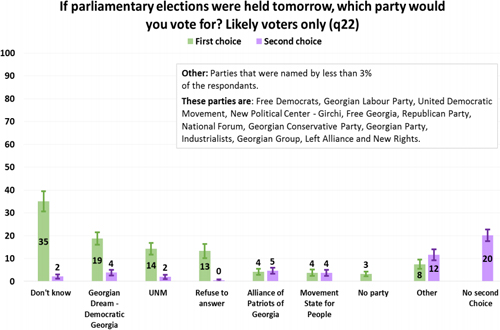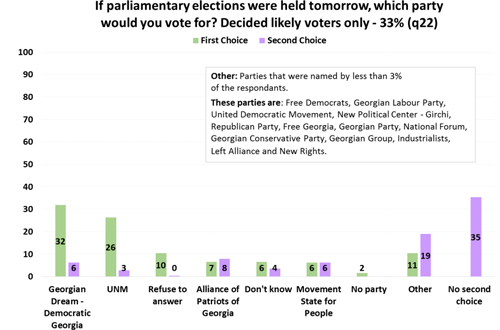Political Ratings in NDI-Commissioned Poll

Source: NDI/CRRC public opinion survey, June, 2016
More than third of likely voters were undecided which party they would vote for, according to a public opinion survey, which was fielded more than three months before the October 8 parliamentary elections, which also showed GDDG ruling party in slight lead over opposition UNM.
The poll, released on Wednesday, was fielded by CRRC for the U.S. National Democratic Institute (NDI) between June 8 and July 6. The survey was conducted through nationwide face-to-face interview with 4,113 respondents and it has a margin of error plus, minus 2.1%.
67% of respondents said they would vote if elections were held tomorrow.
Asked which party they would vote for if parliamentary elections were held tomorrow, 35% of likely voters responded “don’t know”; 13% refused to answer, and 3% responded “no party”.
Georgian Dream-Democratic Georgia (GDDG) ruling party had 19% support among the likely voters, followed by the United National Movement (UNM) – 14%.
State for People, party launched this year by opera singer Paata Burchuladze, and Alliance of Patriots of Georgia were tied with 4% support each among the likely voters.
8% of likely voters named other parties. “Others” include those thirteen parties, which were named by less than 3% of respondents each; among them are: Free Democrats; Labor Party; Democratic Movement; New Political Center-Girchi; Free Georgia; Republican Party; National Forum; Conservative Party; Industrialists; New Rights.

Source: NDI/CRRC public opinion survey, June, 2016
57% of 4,113 respondents surveyed said they are undecided about how they would vote if parliamentary elections were held tomorrow, down from 61% in NDI/CRRC poll in March, 2016.
“Georgians overwhelmingly want to vote in the upcoming elections but have not yet made up their mind, making the election results unpredictable,” Laura Thornton, NDI’s senior country director in Georgia, said. “The ratings for each of the individual parties are so low that they cannot be taken as a guide to the outcome of future elections. With 67% of Georgians planning to vote and 57% undecided, the numbers seen in the final election tallies will look considerably different than the numbers presented in this poll as the results will depend on how these undecided ultimately cast their ballots.”
Asked which of the issues matter the most when voting in parliamentary elections, 41% of respondents named party’s economic policy, followed by party’s stance on healthcare policy (14%); national security issues (11%); parties stance on rule of law and foreign policy – 9% and 8%, respectively.
NDI/CRRC’s previous poll was fielded in March – before the Georgian Dream coalition’s announcement that its member parties were parting ways for the upcoming elections, and before the formal launch of the State for People party. In the March poll, the Georgian Dream coalition had 15% support among the likely voters, followed by UNM – 13%; Free Democrats – 6%; Labor Party – 4%, and Alliance of Patriots – 3%. 38% of likely voters were undecided.
Georgia has a mixed electoral system in which 77 seats are allocated proportionally under the party-list contest among political parties, which clear 5% threshold in nationwide popular vote.
The rest of the 73 lawmakers in 150-seat Parliament are elected in 73 single-member constituencies, known in Georgia as “majoritarian” mandates; a candidate has to win over 50% of votes in order to be an outright winner in the first round, otherwise a second round should be held.
This post is also available in: ქართული (Georgian) Русский (Russian)